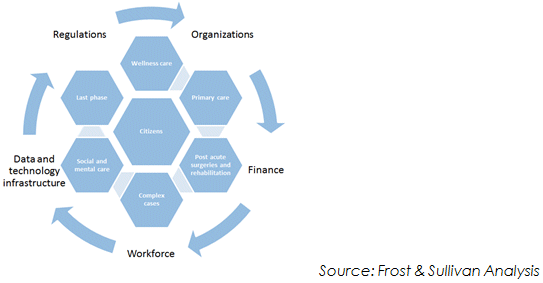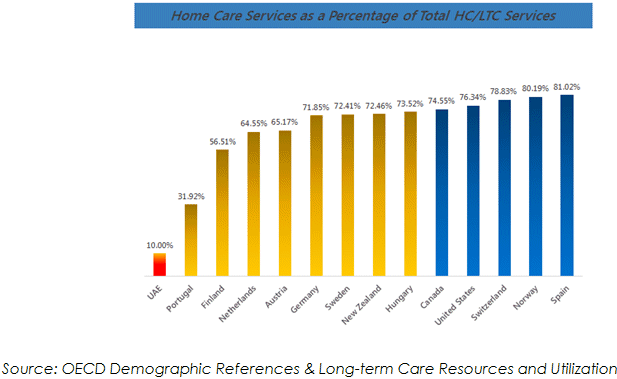Building the blocks to a Connected Hospital to Home Framework
Home care, also referred to as domiciliary care, social care, or in-home care, is medical treatment provided at home by licensed healthcare professionals.
The home care field in the United Arab Emirates (UAE) has been in the spotlight for the past few months due to COVID-19. Most healthcare services, such as elective surgeries, have been suspended to accommodate COVID-19 patients. Thus, the home healthcare field has come to the fore to help patients with chronic diseases and other urgent medical needs. Home care benefits, according to healthcare professionals, include cost-effectiveness to reduce the cost burden on the healthcare system and increased patient access to high-quality care.
Home care has become an essential strategy to face COVID-19 and similar future crises. There is increased awareness amongst patients and their families, and initiatives by public and private sectors developed over a short time have contributed to this. Post-COVID-19, it is expected that the dependence on home care through both public and private sectors will increase. This will further be aided by the current technological advances, such as 5G, ERP systems, unified medical records and digital platforms, promoting an enhanced environment for home care delivery. It is essential, however, to have a comprehensive national corporate governance system in place to establish policies and guidelines to organize service delivery with an appropriate financing mechanism while protecting patients’ records. The workforce will play an essential role during the execution phase; training will be crucial to ensure a complete understanding of the social care requirements and development of family support, as shown in the graph below.

Home care services in the UAE
The current home care utilization in the UAE is low compared to other countries. This is mainly due to the nature of the population in the country, where the elderly (people aged 65 and older) make up a low percentage in comparison to other Eastern countries. Further, expats account for 90% of the population, and they prefer to perform major surgeries and post-acute rehabilitation in their home countries.
Long-term care and chronic patients are the focus of the healthcare authorities in the UAE over the past decade. There have been more service provisions at home for patients under the eligibility criteria and certain conditions allowing long-term care patients to receive proper care at home. However, in 2019, there were more than 25 million outpatient visits and ~800,000 in-patients who received care within a hospital. Post-COVID-19, we expect to see a gradual transfer of these patients from a hospital set up to home care to ensure effective delivery of care to citizens in the UAE.
If we look at Western countries’ reliance on home care, as shown in the graph below, we see that Spain has the highest home care utilization. It is mainly driven by the extensive cash benefits provided to the home care patients, compared to the UAE’s healthcare financing system, which is driven by insurance. Norway has a high demand, satisfaction rate, and utilization rate on home care services. The country has a strong home care organization with a balanced mix of medical care and social support functions. Switzerland has effective provision and utilization of comprehensive home medical care services with substantial geographic coverage and significant patients’ satisfaction. Although the USA has exemplary home care service providers, it is not funded by public institutions; Canada is considered to have one of the best public home care systems, covering a comprehensive range of medical and non-medical services.
The market size is approximately 1,400 home care patients in Abu Dhabi and Dubai. Currently, there are more than 80 licensed home care companies (~50 active companies), most of which are small. A majority of the patients are referred from Abu Dhabi because it is more regulated and insurance coverage by Daman for Thiqa patients is available. The market in Dubai is expected to witness higher utilization of home care services in the future through the Saada program and approved care delivery by a caregiver. Home care services in the UAE are not sufficient, with significant gaps in certain areas, such as wellness, social and mental care.
The UAE government is setting policies and applying more restrictions and regulatory measures such as large fines, to non-compliant companies. In addition, several deals were executed to acquire home care companies, such as Mubadala/Amana Healthcare. Consequently, we expect to see more mergers and acquisitions that will decrease the number of providers in the UAE.
Post-COVID-19, the healthcare system is expected to witness significant changes, with more reliance on digital infrastructure. Digital transformation allows the delivery of care through seamless processes. Establishing comprehensive, virtual home care requires major foundations and infrastructure, including a digital platform, healthcare protocol, policies, guidelines, financing and monitoring. This will allow healthcare services to incorporate virtual care and connected homes.
However, certain concerns related to security threats, privacy breaches, rapid technological changes, and interoperability will need to be addressed or we may see delays and an increase in the cost of digital transformation in the UAE.
For More information or to schedule a dialogue with our analyst, please e-mail Nimisha Iyer at nimisha.iyer@frost.com





